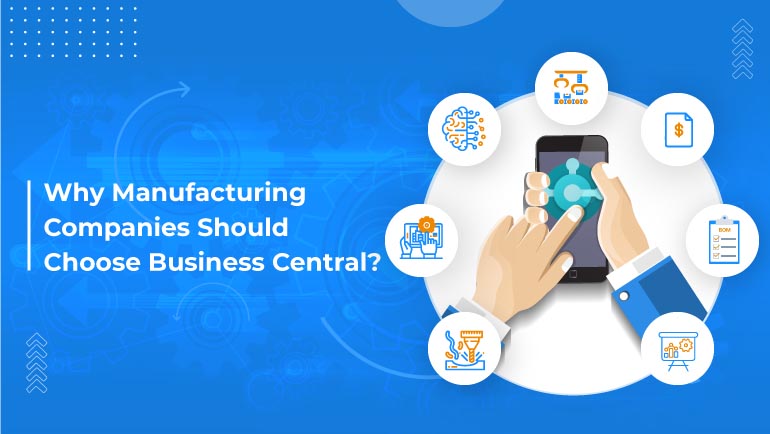What is ERP and how does an ERP system work in an organization?
ERP is the abbreviation for (Enterprise Resource Planning) and includes powerful and strategic business management tools that can be used to manage business processes and information within an organization. It is pivotal to highlight that ERP, through its integrated features, automates processes.
When you deploy an ERP system, you can make all of your departments independent, reduce silos, and allow them to collaborate. ERP has numerous benefits for both small and large businesses. With good ERP platforms in place, business leaders can streamline time-consuming back-office processes.
They can also assist employees in becoming more productive and successful in their roles. Why choosing Microsoft Dynamics 365 Business Central is a prevalent question among many business owners nowadays. Business Central implementation cannot be properly implemented unless you understand how ERP system work. So, with these considerations in mind, let’s take a look at how ERP solutions perform in a specific organization.
ERP (Enterprise Resource Planning) System : A Quick Overview
Consider ERP to be a system capable of managing a database of information pertaining to numerous types of business processes. An ERP system may handle anything from human resource management to customer relationship management.
Many advanced ERP systems also automate and integrate numerous sorts of business processes. In summary, they can dramatically cut manual labour while also allowing you to improve overall efficiency. However, you cannot expect to understand Business Central Implementation Methodology without knowing the actual reasons behind why you need an ERP platform.
Reasons Why Enterprise Resource Planning Is Necessary
Well, the big question is why you need ERP. You are well aware of your company’s objectives as a major business decision-maker. And when the context comes to growth, organization’s don’t take it lightly.
Your earnest efforts will eventually pay off as your company gains new customers. There is no denying that with fast-paced development comes more complicated paperwork and manual processes.
This is why workflow automation is critical for beating your competitors and emerging as the industry leader. You would be able to automate operations and ease smart data transfer with an ERP platform.
Furthermore, you will notice a significant reduction in your operational and overhead costs. ERP platforms boost efficiency and allow you to grow your business interests into new areas.
ERP Systems: How Do They Work?
In most cases, an ERP software system utilizes a centralized database for several business procedures to reduce manual labour. It also greatly simplifies existing business workflows. To be more specific, an ERP system usually comprises dashboards through which users can have access to real-time data collected from multiple departments. One of the best ERP system example is Dynamics 365 Business Central.
This often assists businesses to analyze and measure productivity and profitability. For example, a supply chain solution for ERP would get a custom order and then automatically transmit that information to the main centre so that the business could be completed on time. Without an ERP, data is commonly siloed by department and can be difficult to access across the entire company.
When you use an ERP, data from several departments can be easily shared and viewed across the entire company. As you can see, ERP platforms supply a variety of information that assists in the development of various types of business goals and reduces the total amount of time required for your personnel to fine-tune their overall skills.
Avail A Greater Flow Of Information
ERP Implementation Services can help you avail the true value of your business potential. It should be noted that ERP software covers a wide areas within a organization like sales, purchasing, production, inventory, etc. One of the most important functions of an ERP system is to communicate crucial information to departments that require data. ERP System can also pass information between two branches of the same organization, which is rather impressive.
The data contained in an ERP system provides you with relevant information so that you are always aware of the various business process of the organization.
The Primary Business Benefits of An ERP System
When it comes to delivering business value, ERP has a lot to offer. Here are some of the factors that an ERP System considers when estimating business value.
- You get focused on IT expenditures
- You avail flexible modularity
- Enhances the overall customer relationship management
- Enhances the entire planning and reporting process
- Superior scalability is provided
- Quality and security of data
- Standardized business process
ERP Deployment
An ERP system can be on premise or cloud implementation. There are vendors who provide both ERP implementation methods which is quite astounding. Others, on the other hand, use a hybrid model of deployment. In case you didn’t know, On-premise ERP is implemented directly on your company’s servers.
This indicates that you are responsible for hosting and maintaining the ERP solution. Cloud-based ERP is deployed through the web, allowing users to access the platform from anywhere and anytime. You will require an internet connection to handle all of your business processes from a single dashboard.
Choose a reputable Microsoft Dynamics 365 implementation partner who would provide you with accurate information on various aspects of ERP deployment.
Conclusion
As you can see, ERP systems function in an integrated manner, by eliminating all the issues associated with manual labour. Also, keep in mind that the ERP system should integrate with your in-house software systems so that your organization can work seamlessly.
Another key highlight of Dynamics 365 Business Central is that its highly customizable. It is worth noting that one of the causes of ERP system failure is a lack of planning. As a result, you should select a reputable Dynamics 365 Implementation Partner.
Nevas Technologies is the qualified and highly professional Microsoft Dynamics 365 Business Central partners with 15 plus years of experience. We can make implementation and migration simple and efficient for you. If you have questions about ERP system, please don’t hesitate to contact our team of ERP specialists.




